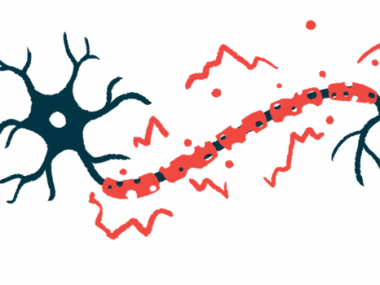How Progress Is Measured
Written by |

I intentionally fell off the treatment table. A metallic taste filled my mouth as I thudded onto the matted floor with a crash, looking less like a superhero and more like a marionette whose strings were cut. My fall was neither steady nor graceful.
Warm blood rushed to my cheeks in a sheepish blush. Even though it’s been over 20 years since my diagnosis, I still wish I were stronger, more in control of my body.
Friedreich’s ataxia taught me to be ashamed of my disabilities.
As I lay on the floor, I reminded myself that I was once a spontaneous guy, always down for a last-minute adventure or a sudden trip. I’d throw a change of clothes in my small, well-worn duffel bag, grab my toothbrush, and be ready to go. I wrote before about how I have a nomad’s spirit, seeking exciting and unfamiliar places.
But now, even a sudden fall to the floor was taxing. It’s hard not to compare my current self to my past self.
Yet I didn’t have time for a pity party, as I was in the middle of my weekly physical therapy appointment. I still had work to do.
“You all right?” my physical therapist asked after I fell to the floor. His words both asked if I was hurt (“Are you all right?”) and told me I was OK. (“You’re all right.”) My therapist speaks in riddles, and I love him for that.
“Make your way to the center of the dance floor,” he added.
I began to roll over, from left to right, away from the treatment table and toward the center of the room.
Regular readers know that I write about my time in physical therapy frequently. I do so because frankly, without a treatment or cure, the FA community has no choice but to deal with FA on our own.
One of the most effective means I’ve found to deal with my FA is through physical therapy, by pushing my diminished capabilities to their limits. I wish I would have focused on staying active earlier in life. Maybe by writing about my little victories from physical therapy, I can encourage others in similar health situations to find hope in remaining as active as possible.
I began my meager exercises on the floor by kicking my legs one at a time to the top of an exercise ball. Then, I maintained a cobra position and rocked back until I sat on my heels. Next was a table position on my hands and knees on the floor.
It was nothing impressive or noteworthy, yet even these simple exercises had me panting. An avalanche of apologies spilled from my mouth.
“I’m sorry,” I said repeatedly.
“Stop saying that,” the sage responded. “Now from a table position, see if you can move one hand.”
I lay flat on my stomach and lifted the top of my body with my arms, like a pushup, then pressed my knees into the ground. Now I was in the wobbly stance of a table.
At first, I couldn’t attempt to move one of my hands without face-planting onto the matted floor. Slowly though, I learned to shift my weight and remain upright as I was able to very slightly move and lift one hand at a time. I did that about five times on each side, then fell flat on the floor.
“Wow,” my physical therapist said, “do you know what you just did?”
Nothing too impressive, I thought.
“Being able to move your hands in that position is the first step of crawling!” he enthusiastically replied.
Possibly learning to crawl? That’s not quite the victory I was hoping for. I didn’t run a lap or do a jumping jack.
Still, crawling would be a lot more convenient than rolling, and I would be a lot more mobile. But the truth is I may not even remaster crawling.
Progress matters, though. In a body defined by ever-decreasing capabilities, every little victory matters, even one as small as the first step in crawling.
I raised my head from the floor, still panting but not finished. I looked at my therapist.
“Awesome,” I said. “What’s next?”
***
Friedreich’s Ataxia News is strictly a news and information website about the disease. It does not provide medical advice, diagnosis or treatment. This content is not intended to be a substitute for professional medical advice, diagnosis, or treatment. Always seek the advice of your physician or another qualified health provider with any questions you may have regarding a medical condition. Never disregard professional medical advice or delay in seeking it because of something you have read on this website.The opinions expressed in this column are not those of Friedreich’s Ataxia News or its parent company, Bionews, and are intended to spark discussion about issues pertaining to Friedreich’s ataxia.






Barbie Miller
😂😂This is funny, but its also not funny. I like your therapists perspective. I view physical therapy as maintenance for my body. Physical therapy is necessary however, I don't want my physical therapist thinking that their exercises are going to majorly reverse the progression of fa.
Matt Lafleur
Hey Barbie, I hear you. It is supreme important that we recognize any progress as little victories and not the reversal of FA. I hope that difference always comes across in everything I write. Thanks so much for reading!